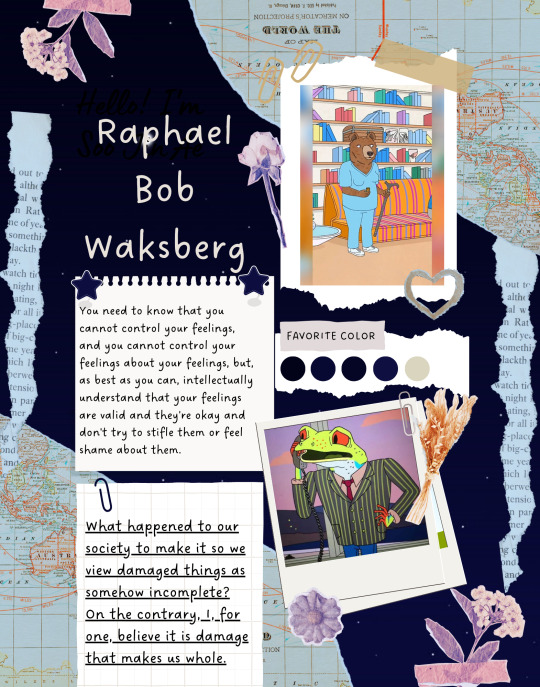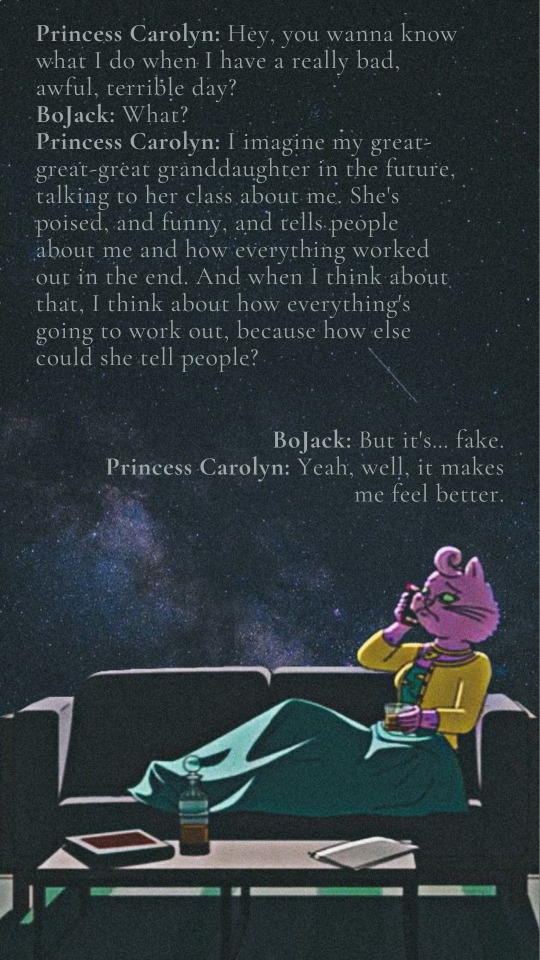The Women Of Bojack Horsemen & Their Mental Health Struggles
Don't wanna be here? Send us removal request.
Text
BoJack Horseman: The Beginning, But This Time It’s About the Women
Welcome to a deeper dive into BoJack Horseman—but not the story you think you know. This blog is dedicated to the women of BoJack, their struggles, strengths, and the nuanced ways they challenge and redefine narratives.
#sarah lynn#bojack netflix#bojack horseman#princess carolyn#diane nguyen#mental health#tv shows#netflix#intro post#introduction#blog intro#pinned intro#introductory post#pinned post
2 notes
·
View notes
Text

Why Mental Health Representation Matters: 5 of the Many Reasons
2 notes
·
View notes
Text

The Creator of BoJack Horseman: Two Truths he lives by
#raphael bob waksberg#bojack netflix#bojack horseman#mental health#netflix#diane nguyen#princess carolyn#collage#tv shows#sarah lynn
6 notes
·
View notes
Text

Beyond Dark Humor: The Relatability of BoJack Horseman and its Depiction of Mental Health
Bojack Horseman focuses on mental dissatisfaction, reflecting the struggles of real-life individuals. This graph is from a study conducted by Aneesha Singh. The research involved a semi-structured interview approach and analyzed the responses gathered from participants. A questionnaire was used designed by the American Psychiatric Association (APA) to collect data from a sample of 100 participants. The study suggests that the series’ positive impact stems from its ability to make viewers feel less alone and to encourage them to look forward to better days. This positive effect is facilitated by the show's relatability, as viewers see their own experiences mirrored in the characters.
(https://iipseries.org/assets/submission/iip2023CAA34410FC72DF5.pdf)
#tv shows#bojack netflix#diane nguyen#netflix#bojack#bojack horseman#princess carolyn#sarah lynn#mental health#surveys
3 notes
·
View notes
Text

Finding Comfort in Fake Endings
6 notes
·
View notes
Text
Not Every Fix Has a Solution: Princess Carolyn’s Quiet Battles
In BoJack Horseman, PC’s character arc is one of quiet heartbreak and relentless perseverance. While many of the show’s characters wear their trauma on their sleeves, PC’s pain is far more private, unfolding subtly over several seasons. Central to her emotional journey are her five miscarriages, where each is a devastating experience that she masks behind her ever-present drive for perfection. This essay explores how these repeated losses reflect her mental health struggles and shed light on the broader theme of resilience in the face of chronic grief.
PC is a fixer and learned early on to take care of others. She thrives on solving problems, but when it comes to her desire for motherhood, there’s no quick fix, no crisis to manage. Each miscarriage represents not only personal loss, but also a setback in her emotional growth. For a character so accustomed to holding everything together, these moments of loss force her to confront her own vulnerability.
In the episode Ruthie, PC imagines her future daughter telling the story of one of the worst days of her life, turning pain into a narrative triumph. It’s a coping mechanism, even telling BoJack that it makes her feel better, when she has “a really bad, awful, terrible day”. This is her way of giving meaning to suffering that otherwise feels unbearable. But the reality is far less tidy. She ends that day sobbing in her living room, her carefully constructed mask slipping away in a rare, raw moment of honesty.
After each loss, PC throws herself deeper into her work. For her, work is a shield, a way to keep moving forward without ever having to stop and process her grief. The more she loses, the harder she works, as if sheer force of will can eventually bend the universe to her desires. Her relentless hustle is admirable, but it’s also exhausting. It leaves her isolated, emotionally depleted, and, most dangerously, convinced that asking for help is a sign of weakness.
In The Amelia Earhart Story, PC admits, “I’m so tired of being strong.” It’s a rare admission from a character who prides herself on her toughness. For her, strength has always meant endurance, surviving at all costs. But this moment reveals the cost of that survival: loneliness, exhaustion, and an overwhelming sense of being trapped in a cycle she can’t break.
The turning point in PC’s story comes when she finally allows herself to let go of the rigid expectations she’s placed on her life. Her decision to adopt baby Ruthie isn’t a consolation prize but an act of self-compassion. For once, she acknowledges that life doesn’t have to follow a perfect script. In embracing the messiness of her reality, she begins to heal, not by erasing her past trauma but by making space for a different future.
This shift reflects an important message about resilience. It’s not about bouncing back or pretending everything is fine, it’s about learning to live with what’s been lost while still finding joy where you can. PC’s story reminds us that grief and happiness aren’t mutually exclusive.
PCs journey is a deeply moving exploration of loss, resilience, and the importance of allowing ourselves to be vulnerable. Her five miscarriages are not just moments of personal tragedy, they represent a broader struggle to reconcile ambition with the realities of life’s unpredictability.
In the end, PC doesn’t achieve picture-perfect life. But she does find something far more valuable: the understanding that it’s okay to stop fighting every battle alone. Sometimes strength isn’t about pushing through, it’s about knowing when to rest.
Written by Dilan Ulutas
5 notes
·
View notes
Text

What do You feel when You have achieved all Your Desires?
2 notes
·
View notes
Text

The Feel Good Story: A Workaholic finds Love and Happiness
2 notes
·
View notes
Text
Always the Fixer never the Fixed (Credits to strawberry.shortcake555 on TikTok)
0 notes
Text

Lost Dreams
0 notes
Text

Toxic Symbiosis
6 notes
·
View notes
Text
Beyond the Headlines: Understanding Sarah Lynn's Mental Health
Sarah Lynn's character in BoJack Horseman is a tragic depiction of the consequences of childhood stardom, addiction, and untreated mental illness. From the beginning of the series, it is clear that she struggles with severe substance abuse, using drugs and alcohol as a coping mechanism. Her addiction starts at a young age and becomes a defining feature of her self-destructive behavior. A key theme in Sarah Lynn’s character arc is her deep self-hatred and low self-esteem. She openly admits that she does not like anything about herself and believes that her worth is tied solely to what others want from her. This mindset drives her destructive choices and reinforces her unwillingness to seek help or change. She resigns to a path of engaging in behaviors that harm her both physically and emotionally. Her past trauma, particularly her „daddy issues“, is another significant factor in her struggles. There are hints of sexual abuse by her father, which contributes to her desperate need for male validation. Thats where her relationship with BoJack comes in, whom she sees as a father figure. However, rather than providing her with guidance or support, BoJack enables her worst tendencies. He satiates his own shortcomings in this way. Their relationship, instead of being a source of healing, accelerates their mutual self-destruction, ultimately leading to Sarah Lynn’s death. Even when she achieves sobriety, Sarah Lynn’s addiction proves to be cyclical. The moment BoJack calls her, she relapses without hesitation, slipping back into her old patterns. She even wears the same clothes from her lowest point, symbolizing that she never truly changed. Her coping mechanisms—focusing on her body image, using sex to gain validation, and relying on substances to numb her pain—are all ways she distracts herself from her underlying issues. Sarah Lynn’s story is also one of lost dreams. She did not choose to be a child star. Her career was imposed upon her, placing her in an environment where she was constantly in the spotlight. As a child, she wanted to be an architect, but her mother discouraged her, dismissing college as something for “ugly people.” Her mother's actions and words make it clear that she values fame and success in the entertainment industry much more than her daughter's happiness. She pushed Sarah Lynn into a career she did not want and made it clear that her only value was as a child star. This forced stardom is a common theme for many children in the entertainment industry, they experience abuse but are forced into the industry, where they suffer from immense pressure and exploitation. Ultimately, Sarah Lynn’s story is one of tragedy. She is always “this close to falling off the deep end,” and BoJack, the one person who could have listened and helped her, disappoints her instead. Her final days leading to her overdose—illustrate her desperation to escape from herself. Her death is a direct consequence of BoJack’s actions, but it is also a result of a lifetime of systemic neglect and personal torment. Sadly, while Bojack gets to redeem himself and work on becoming a better person Sarah Lynn never gets the chance to break free. Through her, BoJack Horseman paints a heartbreaking picture of how fame, trauma, and addiction can consume a person, leaving them trapped in a cycle they can never break free from.
Written by Atonnia Wolter
6 notes
·
View notes
Text

Welcome to Hollywoo!
4 notes
·
View notes
Text

What's on Diane Nguyen's Mind?
3 notes
·
View notes
Text

Writers Block: Emotional Edition
3 notes
·
View notes

